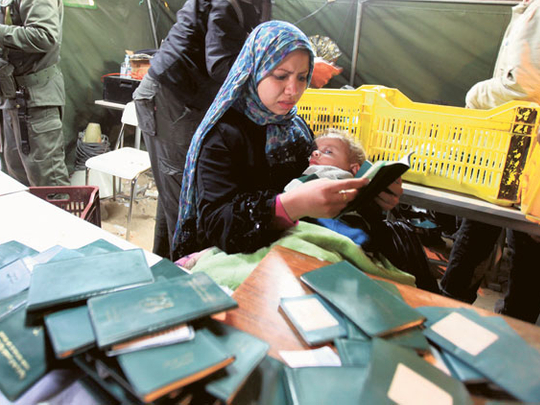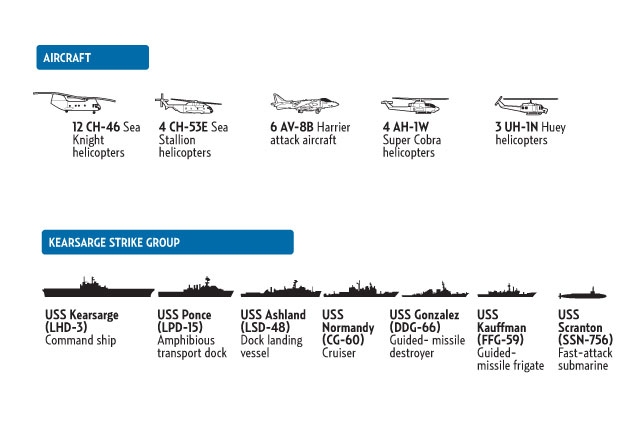
Ras Jdir: Nigerian Ike Emanuel buried his 6-month-old baby girl in the desert last week after she died of exposure on a desperate trek to escape Libya as it lurched closer to all-out civil war.
He was among thousands who reached the safety of Tunisian soil on Wednesday, hungry, exhausted and mostly destitute.
The International Organisation for Migration yesterday said it had started to evacuate migrants trapped in the Libyan port of Benghazi, the country's second largest city.
"IOM is today beginning its first evacuations of migrants out of the Libyan port city of Benghazi," said the inter-governmental agency.
The first migrants would be taken in small groups by road to the Egyptian border at Salum, "until sea evacuations are organised to Alexandria in Egypt," it added in a statement.
About 5,500 migrants have been identified for evacuation so far. Most are from Bangladesh, India or Sudan, but small groups of Syrians, Ghanians and other nationalities are also waiting for a way out of the revolt-hit country.
"I lost my baby. She died and we buried her in the desert," Emanuel, 35, told Reuters. "We spent three days in the desert and she was a little baby of six months and she could not endure the cold," he said. "I am going home with nothing, going home again without my baby which can be my future."
Urgent appeals from Tunisia and angry protests by stranded refugees, mainly Egyptians, prompted France and Britain to order an evacuation airlift from Tunisia to Cairo. An Egyptian naval vessel took on 1,100 at the port of Zarzis and two US navy vessels were on their way to support a further possible sealift of tens of thousands now sheltering in a UN relief agency tent camp and Tunisian emergency accommodation.
No help
Thousands of Bangladeshi migrant workers stood at the Ras Jdir border gates at first light, angry at their government for sending no help. Some had slept for four days in the open on the Libyan side of the border through cold nights. In an appeal written on a bedsheet, they urged Tunisia and the world to "save the lives of 30,000 Bangladeshis".
"Nobody from the Bangladesh government came to ask us what is our situation, how can we leave or to bring any kind of help," said Mohammad Aslan, 35, from the Bangladeshi district of Jessore, calling it a great misfortune to be born Bangladeshi.
The frustration of Egyptians, who are 90 per cent of the estimated 85,000 who crossed to Tunisia, was near boiling point.
"The government are sleeping, the people are sleeping, the army are sleeping and we say: ‘Thank you Egypt, thanks for nothing'," said one young man who gave his name only as Mohammad.
In the border compound, under a grove of trees, two thousand refugees have built a ramshackle camp of their own with shelters made of piled baggage and plastic sheeting. They huddled around camp-fires in the early morning chill.
They formed long but orderly lines for food handouts and for toilets. They also queued to buy SIM cards to replace those taken from their mobile telephones at Libyan checkpoints.
Two Tunisians working from a booth sold mobile phone cards as fast as they could install them to men anxious to call home.
Two US amphibious assault ships passed through the Suez Canal and were deploying to assist a possible evacuation. France and Britain said they would evacuate thousands of Egyptian workers stranded on Tunisia's border by air and sea.
Sources at Tunisia's Djerba airport said 33 charter flights repatriated Egyptian and Chinese refugees on Wednesday. British officials said 40,000 more were waiting on the Libyan side.
Ivan Buendia Gayton of Medecins Sans Frontieres said it was "impossible to say" how many more were trying to make it out through Libya. "We've seen no wounded," he said. "But anecdotally we are told there are wounded and there is a need for trauma treatment medical supplies."
There was no sign of officials at the imposing Libyan border post — until a handful of reporters ventured into Libyan territory to watch yet more Egyptian and Sudanese migrants trudging out through ankle-deep piles of discarded clothing, blankets, litter and broken suitcases. The rebel National Libyan Council said it believed Niger, Mali and Kenya were sending troops to support Gaddafi.














